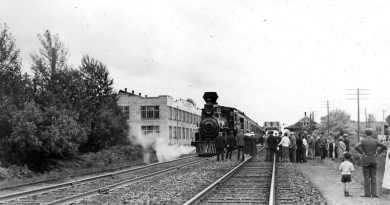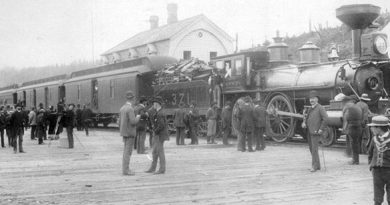As the English See Us
VANCOUVER DESCRIBED IN A BRITISH JOURNAL
Its cosmopolitan people — A Coming Trade Centre — Social Life in a New City — Who Should Come West — The Matrimonial Market
The following article, descriptive of Vancouver and British Columbia from the pen of T.H. Moore, of Liscard, England, appeared in a recent issue of the Wallasey and Wirral Chronicle. It contains in brief form some very pertinent remarks on the Pacific Province of Canada:
The part of the Pacific coast that I know best is in British Columbia, the country round the mouth of the Fraser River, English Bay and Burrard Inlet, where two cities are situated, New Westminster and Vancouver. They are eleven miles apart; the first named is about thirty years old, and the latter about five years old. It is Canada’s latest new city, and a most wonderful city it is for its age. It is the Pacific coast terminus of the Canadian Pacific Railway.
Five or six years ago the site of Vancouver was a “howling wilderness,” covered with the largest sized forest trees, such as Douglas fir, pine, hemlock, and cedar. Now you find a beautiful city of over 17,000 inhabitants, that has every modern convenience. It is brilliantly lighted up by electricity and gas; it has electric train cars, and three opera houses, the last one built of granite. It has fine churches for all denominations, comprising three Church of England, three Methodist, one Roman Catholic, two Presbyterian, one Congregational, one Baptist, and a Salvation Army barracks. There are three large public schools, and many public buildings, as well as fine blocks of brick and granite stores and warehouses. For a city five years old, it is
A VERY INTERESTING PLACE
to live at. You see people of all countries; and in the harbor are ships loading for China, Japan, Hongkong, South America, Australia, and New Zealand. Lumber, granite, coal, fish, and country produce, are exported; and fortnightly boats arrive from the Orient, bringing passengers and freight from India and other countries of Asia.
There are also daily trains and stages to other parts of British Columbia, and daily steamboats to Victoria, 80 miles distant, and to the Pacific coast cities of the United States, such as Seattle, Tacoma, Portland, San Francisco and Los Angeles; also to China and Japan. Fruit is cheap and plentiful, and just opposite the city, fruit ranches are being started and likely to thrive, for in the older parts of the province fruit has long grown in profusion, such as strawberries, apples, pears, peaches, raspberries and cranberries. Land near the city, suitable for fruit raising, is sold in small lots of five acres or less, at from $100 to $200 an acre. This land is up the sunny valleys across the inlet, overlooking the city.
There is one ferry boat now and another is being talked of, or any rancher could have their own private rowing or sail boat to cross to the city with, or to sail for pleasure on the many miles of inland water. The city is well equipped with water works [note: water had been piped to Vancouver from the north shore since March of 1889], and is naturally well drained, for the ground on which Vancouver stands is like a saucer turned wrong side up, and there is clear, sparkling water on every side but one. On three sides are False Creek, English Bay, and Burrard Inlet.
Near the city is Stanley Park, which contains a drive of nine miles round. At the resting places on this route there are seats and arbors, from which you have fine views of the mountains and sunny valleys around the Inlet, and of a very high mountain, perpetually covered with snow, in the State of Washington, called Mount Baker.
Six miles from Vancouver you come to thousands of acres of prairie land, from which four to five tons of hay to the acre can be raised, and a thousand dollars worth of strawberries to the acre. At some of the old orchards, 20 miles from Vancouver, plums were so plentiful last year that they were given to the pigs. On the Fraser river salmon are marvelously plentiful. There has been a good deal of fruit and salmon wasted, but this will not be the case much longer, as canneries are being started. There are thousands of acres of agricultural and pastoral land as well as mineral lands in British Columbia, and the industries are numerous, consisting of lumbering, fishing, ship building, mixed farming, mining, manufacturing and trading.
Coal is plentiful and of good quality, and is much exported to San Francisco. Nanaimo, 35 miles from Vancouver, is the chief coal centre, and it is a fact that one ton of Nanaimo coal goes as far as three tons of California coal. The climate of this part of British Columbia is just right. The winters are short and mild, and the summers long and cool. Any one emigrating need have no fear in
THIS DELIGHTFUL COUNTRY
of starvation or privation, nor will civilization be left behind, for the new towns and villages which are continually springing up commence where older places leave off, and in the very newest towns in existence you find the latest modern inventions in common use before they are scarcely known in older places. As to who should go there, I would say men and women who have any useful occupation, men of capital, and family men with large families, the more children the better, for every child is valuable in a new country, and grows up larger, taller and stronger than if left in England, and learns to be more useful.
Young women are wanted more than men, for there are many bachelor homesteaders throughout the country, and also in the cities. Chinamen have to be used for housemaids and general servants for enough female domestics cannot be got; when they are got, the wages are $25 a month.
Everyone who goes should be perfectly acquainted with some industry. Carpenters, bricklayers, blacksmiths, laborers, cooks, domestic servants and dressmakers get well paid for their work. But clerks often have to turn common laborers, unless they are thorough double-entry book-keepers. For when a mining or lumber company want a clerk they want a man who can give a complete statement of the company’s affairs.
As for accomplished young ladies, I would not advise many to go, unless imbued with a missionary spirit, and go with the object of bestowing themselves on the numerous bachelors of the country, and save them the trouble of their journey east in search of a helpmate after they had made their pile. The few young ladies who are already there are often very much perplexed, for when three young men and two old bachelors are hovering around one young lady it is very trying on her judgment, and sometimes, as Byron says —
It soothes the awkward squad of the rejected
To see how badly she selected
Young ladies who have a complete knowledge of their accomplishments can get along very well, independently of man. I have known some get good pay for playing on an organ, singing in a church, or giving music lessons. In almost all new places the people are very sociable, and strangers are welcomed like long lost brothers. Last winter in Vancouver the Methodists had an “International supper,” including almost all nations—English, Canadian, American, Chinese and others. The place was very much crowded, and it was quite a struggle to get a seat at the tables. After
THE ENGLISH TABLE
was once filled up it was a hopeless case getting a chance there, for the people who sat there filled themselves so much more slowly than the Canadians, Americans or Chinese. I noticed some sat down twice at the American table, and then looked longingly at the English table, but it was a hopeless case.
The Chinese had a very delicate spread, including very small china cups and plates, delicious tea served in tiny cups with lids on; their eatables consisted of ducks, chickens, fruit and pickles, with “chop sticks” to eat with instead of knives and forks. Their table was as clean and neat as the others, and was much patronized by white people. At the same place the Chinese mission gave a musical entertainment, conducted by two American young ladies, who have charge of the mission.
I have said before there is a very nice chance for boating and yachting on the waters around Vancouver. On a fine day you see numbers of the citizens out rowing and sailing, in fact there are many who seem to do little else. After they have bought a lot, built a home, and let their money out at 10 or 15 per cent, they go “paddling their own canoe,” and seem to enjoy themselves as much as the Indians.
The Indians seem to have a fine time on the water; you see large canoes filled with Indian men, women and children. They are very often fishing, but mostly paddling idly about. They are said to wonder why the white people are so busy building up the city. They have their settlements all along the banks of the Inlet and up the coast, and are the most self-supporting of any Indians in North America. Some earn as much as $800 in a summer catching salmon for the canneries. There is a $100 fine for selling liquor to an Indian, yet they get hold of it and prize it very much.
[That’s where the piece ends, rather abruptly. One suspects there was more, but this is what the World’s editors gave us.]

!["Off For Sechelt" [S.S. "Sechelt"]](https://vancouverhistory.ca/wp-content/uploads/2009/12/301eedda-8cbb-4506-aee5-9d4f17f403d8-A24242-800x445.jpg)

